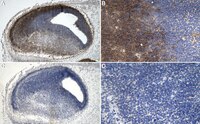MABS2773-25UG Sigma-AldrichAnti-c-Kit/CD117 Antibody, clone H2C7
Anti-c-Kit/CD117, clone H2C7, Cat. No. MABS2773, is an Armenian hamster monoclonal antibody that detects c-Kit/CD117 and is tested for use in Immunocytochemistry and Immunohistochemistry.
More>> Anti-c-Kit/CD117, clone H2C7, Cat. No. MABS2773, is an Armenian hamster monoclonal antibody that detects c-Kit/CD117 and is tested for use in Immunocytochemistry and Immunohistochemistry. Less<<Recommended Products
Overview
| Replacement Information |
|---|
| References |
|---|
| Product Information | |
|---|---|
| Format | Purified |
| Presentation | Purified armenian hamster monoclonal antibody IgG in buffer containing 0.1 M Tris-Glycine (pH 7.4), 150 mM NaCl with 0.05% sodium azide. |
| Quality Level | MQ200 |
| Physicochemical Information |
|---|
| Dimensions |
|---|
| Materials Information |
|---|
| Toxicological Information |
|---|
| Safety Information according to GHS |
|---|
| Safety Information |
|---|
| Storage and Shipping Information | |
|---|---|
| Storage Conditions | Recommended storage: +2°C to +8°C. |
| Packaging Information | |
|---|---|
| Material Size | 25 μg |
| Transport Information |
|---|
| Supplemental Information |
|---|
| Specifications |
|---|
| Global Trade Item Number | |
|---|---|
| Catalogue Number | GTIN |
| MABS2773-25UG | 04065270937957 |

















